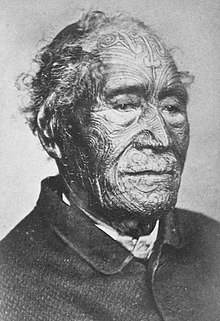Tāmati Wāka Nene
| Tāmati Wāka Nênê | |
|---|---|

Tāmati Wāka Nene c. 1870
|
|
| Born | c. 1785 |
| Died | 4 August 1871 |
| Nationality | Māori |
Tāmati Wāka Nene (c. 1785 – 4 August 1871) was a Māori rangatira (chief) of the Ngāpuhi iwi (tribe) who fought as an ally of the British in the Flagstaff War of 1845–46.
Tāmati Wāka Nene was born to chiefly rank in the Ngāpuhi iwi of the Bay of Islands and Hokianga regions of the North Island of New Zealand. His elder brother was Eruera Maihi Patuone. He was related to Hongi Hika and could trace his ancestry by a number of lines back to Rāhiri, the founder of the Ngāpuhi. He rose to be one of the war leaders of the Ngāpuhi taking an active part in the Musket Wars of 1818–1820. He successfully took his warriors on a rampage the whole length of the North Island, killing and plundering as he went until he reached Cook Strait. It is said that he advised Te Rauparaha to acquire muskets to enhance his influence.
In 1828 he successfully averted a war between the Māori of the Bay of Islands and the Hokianga. Then his older brother moved south to what is now the Auckland region, Hauraki, and soon after the paramount chief of the area died of wounds received in battle. Wāka Nene now became the highest ranking chief among his own people and one of the three primary chiefs of the area. At baptism, he added "Tāmati Wāka" (Thomas Walker) to his name.
Early on he had recognised the value of trade with Pākehā and used his position as chief to protect and encourage both the traders and the Methodist missionaries. He was baptised in 1839 taking the name Thomas Walker or Tāmati Wāka. He also worked with the British Resident, James Busby to regularise the relationships between the two races. In 1835 he signed the Declaration of the Independence of New Zealand which proclaimed the sovereignty of the United Tribes.
...
Wikipedia
